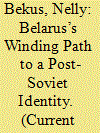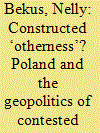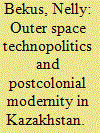| Srl | Item |
| 1 |
ID:
169615


|
|
|
|
|
| Summary/Abstract |
“Some of the state’s recent initiatives have sought to reappropriate ethno-cultural and pre-Soviet history and tradition, shaping a new politics of identity.”
|
|
|
|
|
|
|
|
|
|
|
|
|
|
|
|
| 2 |
ID:
151827


|
|
|
|
|
| Summary/Abstract |
The rise of Belarus to political independence has required it to delineate its cultural boundaries in-between two ‘Others’—Poland and Russia. This essay explores a range of portrayals of Poland in Belarusian cultural artefacts, including television programmes, film, novels, and theatre performances—from the image of an ‘Other’ that threatens Belarusian identity, to the main ally supporting the European choice of Belarusians. Examples from Belarusian cultural texts analysed in the essay show how representations of Poland are grounded in selective and ideologically driven interpretations of Belarus’s own past, while their coexistence reveals the contested nature of the geopolitics of Belarusian identity.
|
|
|
|
|
|
|
|
|
|
|
|
|
|
|
|
| 3 |
ID:
153973


|
|
|
|
|
| Summary/Abstract |
This article addresses the ways in which the systemic transformation of the former Soviet republics has been reflected in urban development in two capital cities, Minsk (Belarus) and Astana (Kazakhstan). Changes taking place in these capitals have been analysed through the prism of an ideological recycling of the socialist legacy, a concept that permits exploration of which aspects of the socialist legacy have been jettisoned and which retained, in the process of formation of a capital. The article explores the nationalising strategies adopted by Belarus and Kazakhstan and reified by various practices, including those involving the recasting of cities. These strategies, however, are analysed not as inventions of post-Soviet regimes, but as forms of structural continuity.
|
|
|
|
|
|
|
|
|
|
|
|
|
|
|
|
| 4 |
ID:
185927


|
|
|
|
|
| Summary/Abstract |
This article examines the role of outer space technopolitics in post-Soviet Kazakhstan. It explores how outer space, the technological artefact of global relevance, works as a postcolonial fetish of modernity that is called upon to produce what it represents, that is, the reality of a technologically advanced Kazakh nation. The article shows that in its project of becoming a spacefaring nation the country reiterates major incentives that have motivated nuclear and space programme development in the postcolonial context of the Global South. It explores how collaboration with Russia allows Kazakhstan to claim its share in the Soviet space legacy rather than to distance itself from it. The study then traces the rise of a new internationalism in the Kazakhstani space programme outside the post-Soviet context. The article contributes to the debate on postcolonial technopolitics and shows how outer space has been used to enhance the conventional domain of postcolonial national ideologies – nativism and tradition – with technology and science. Finally, it depicts how the growing resistance to the space programme among Kazakh civil society groups reveals a close association of the environmental agenda with an ‘eco-nationalism’ permeated by a profoundly anti-imperial and, ultimately, anti-authoritarian political discourse.
|
|
|
|
|
|
|
|
|
|
|
|
|
|
|
|